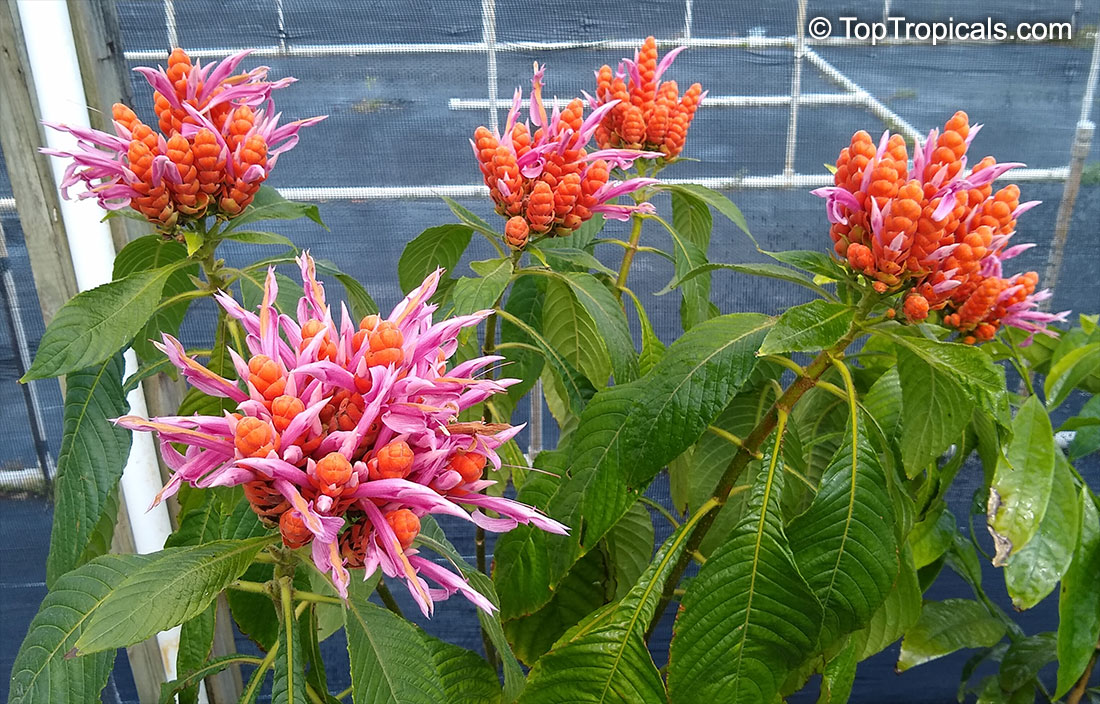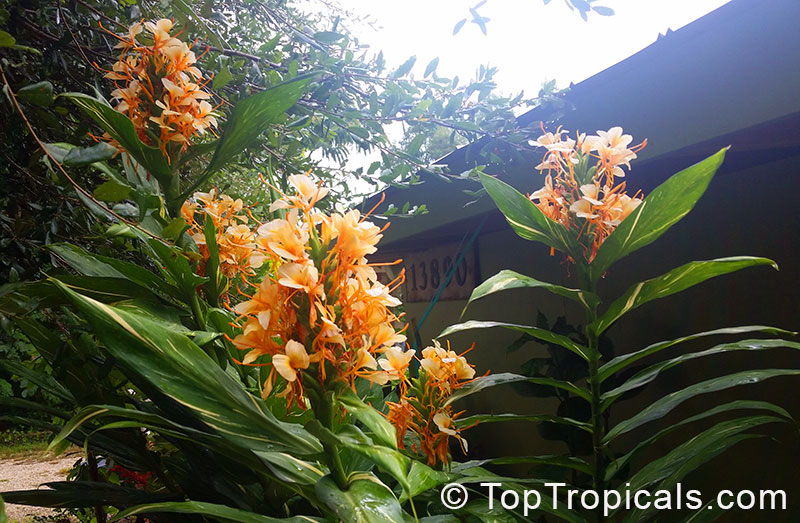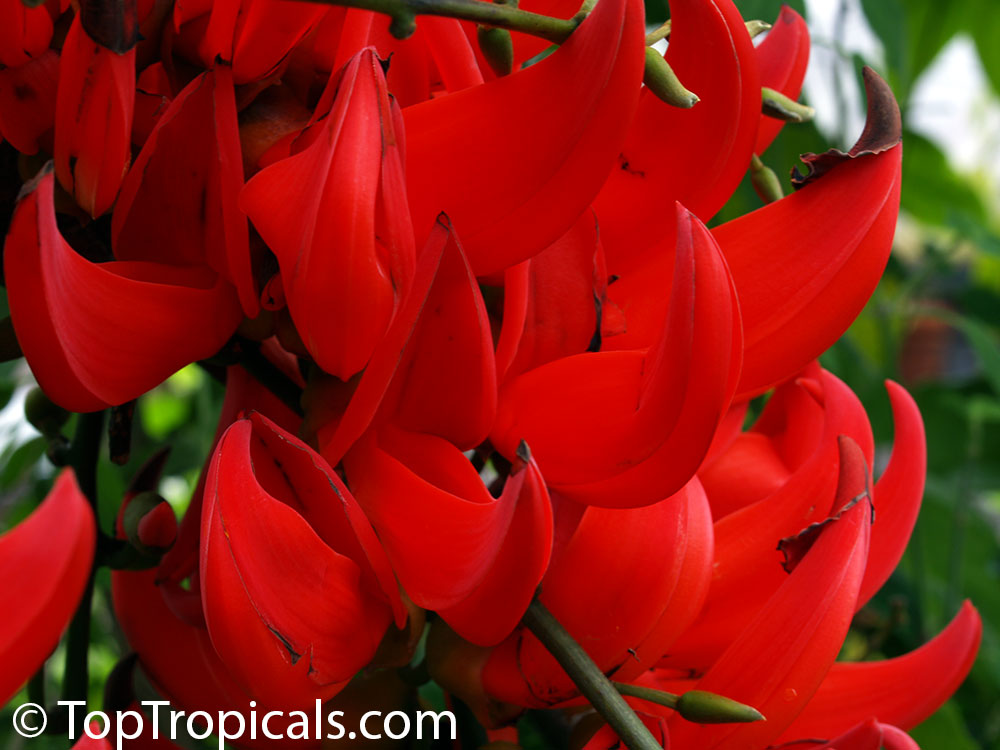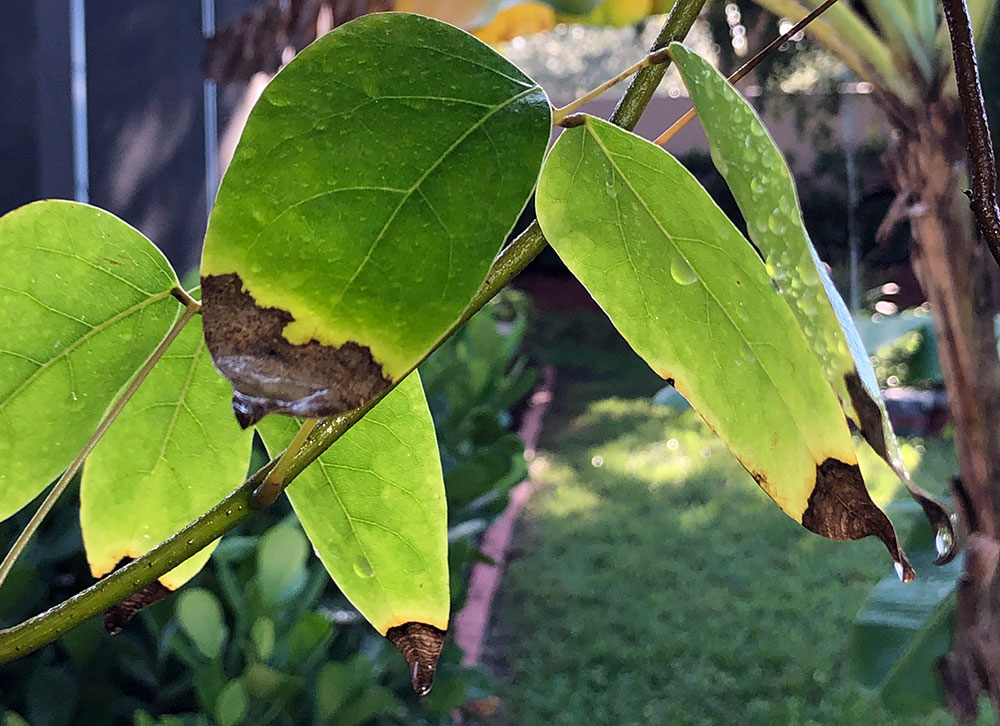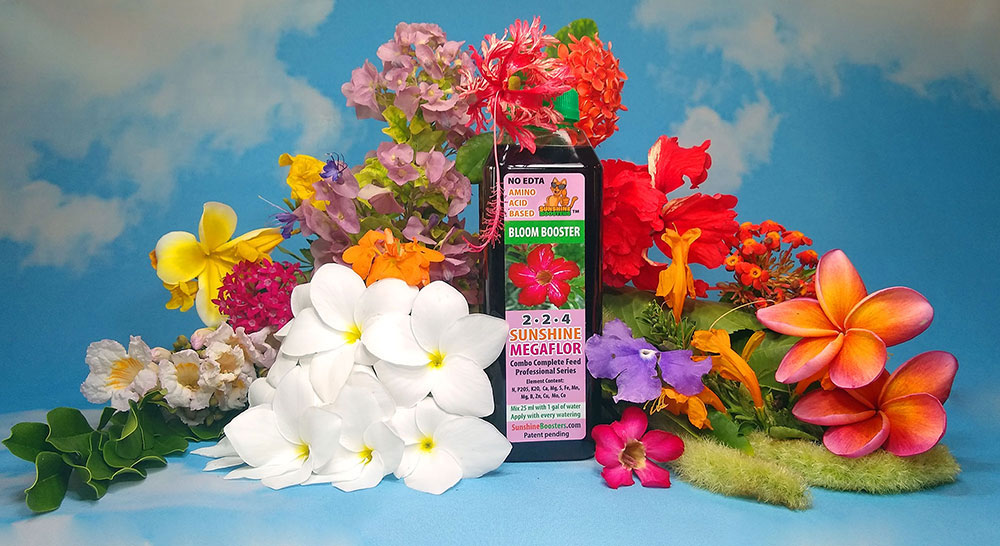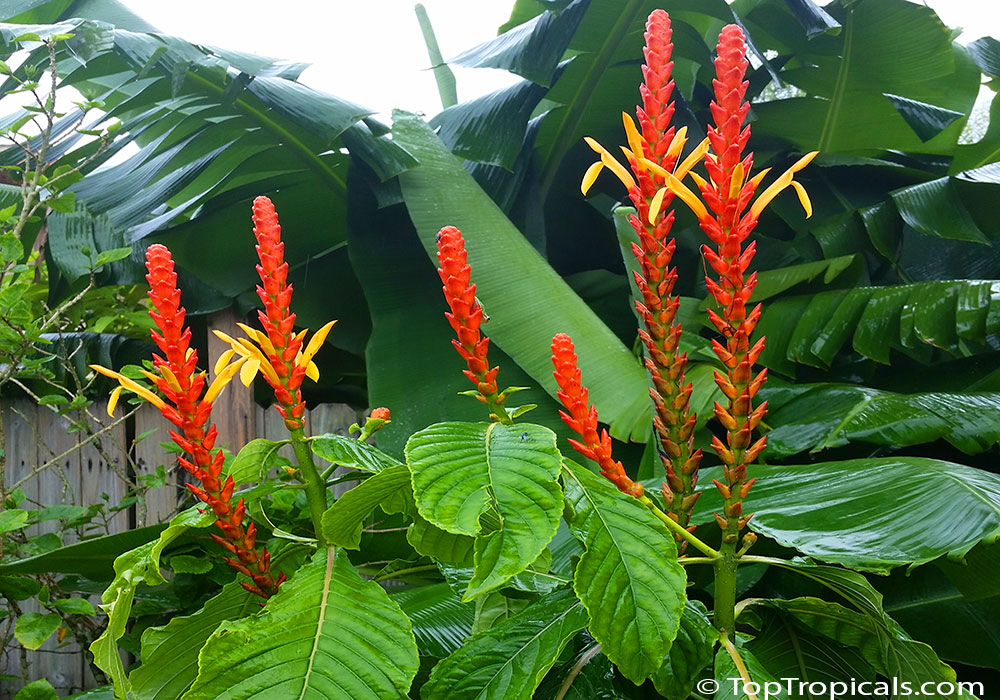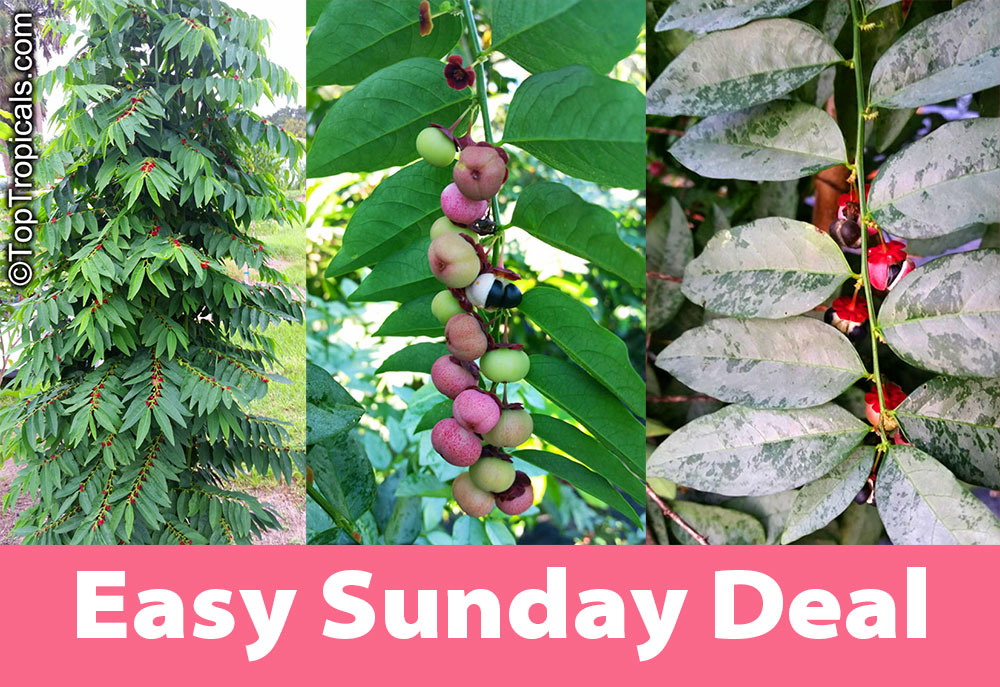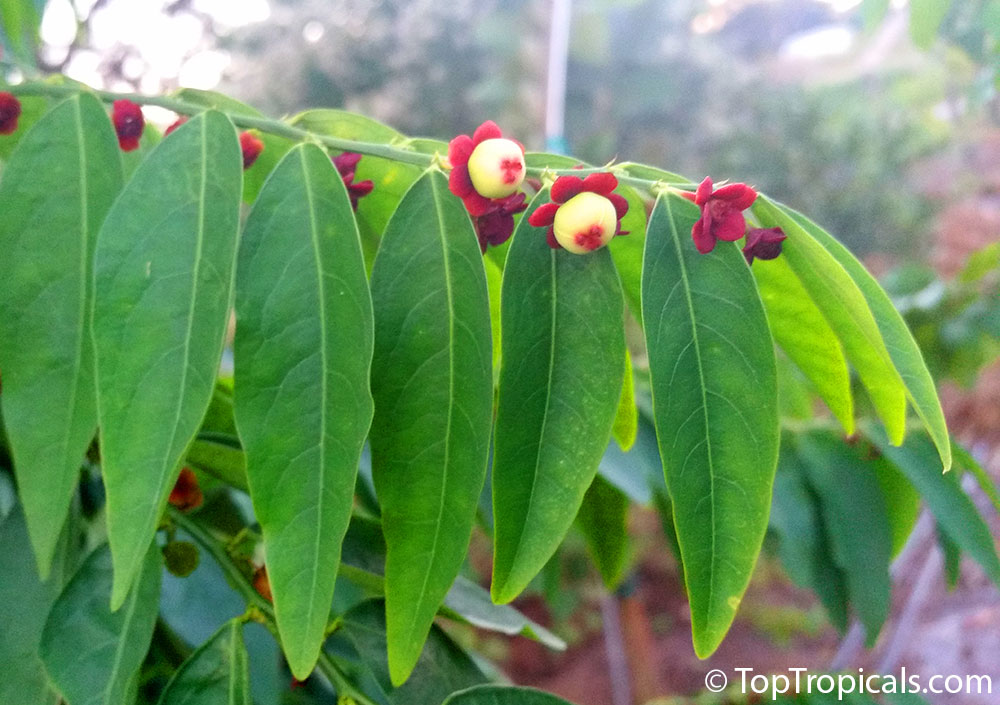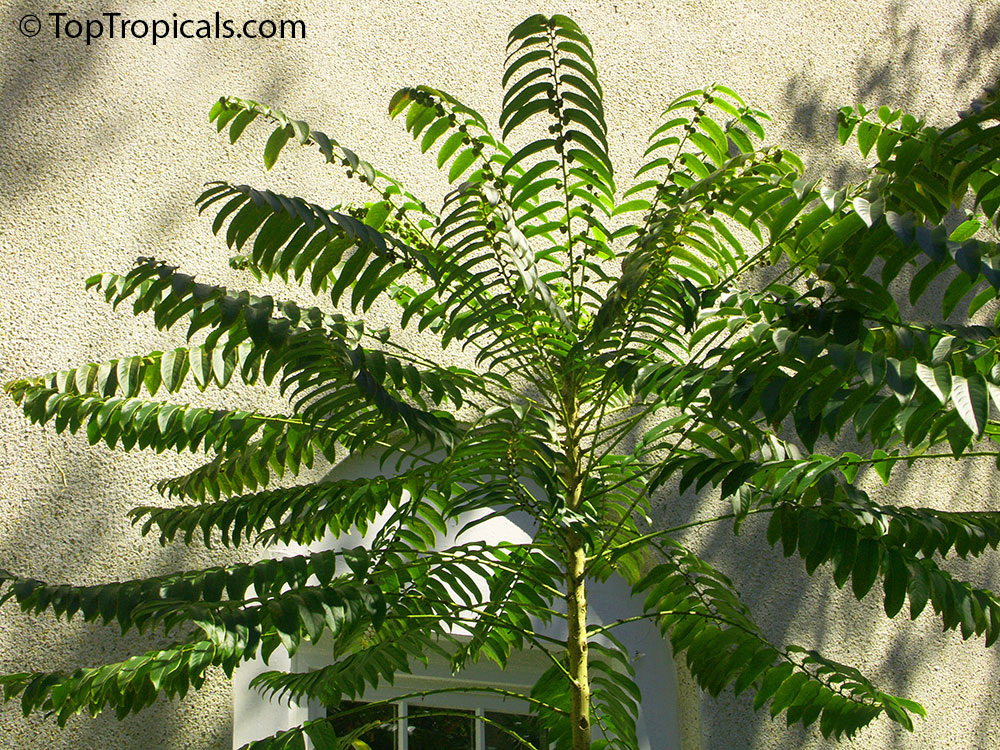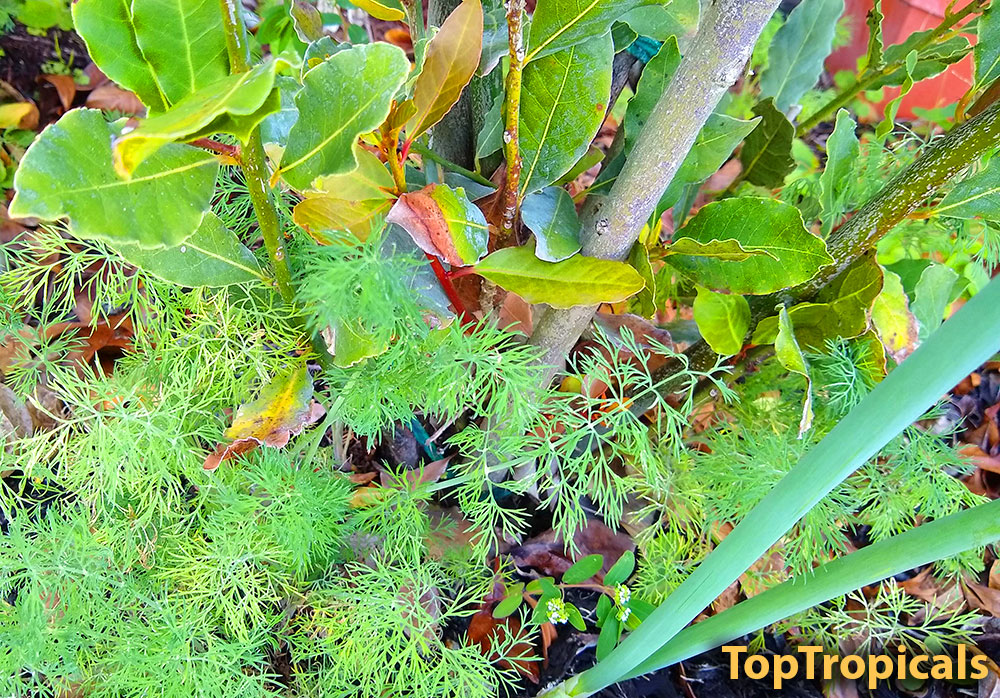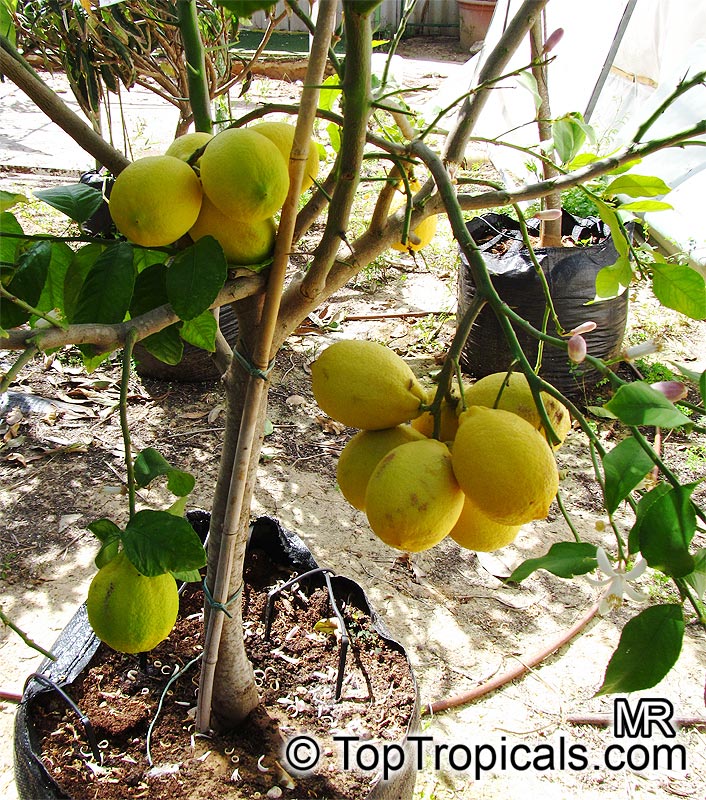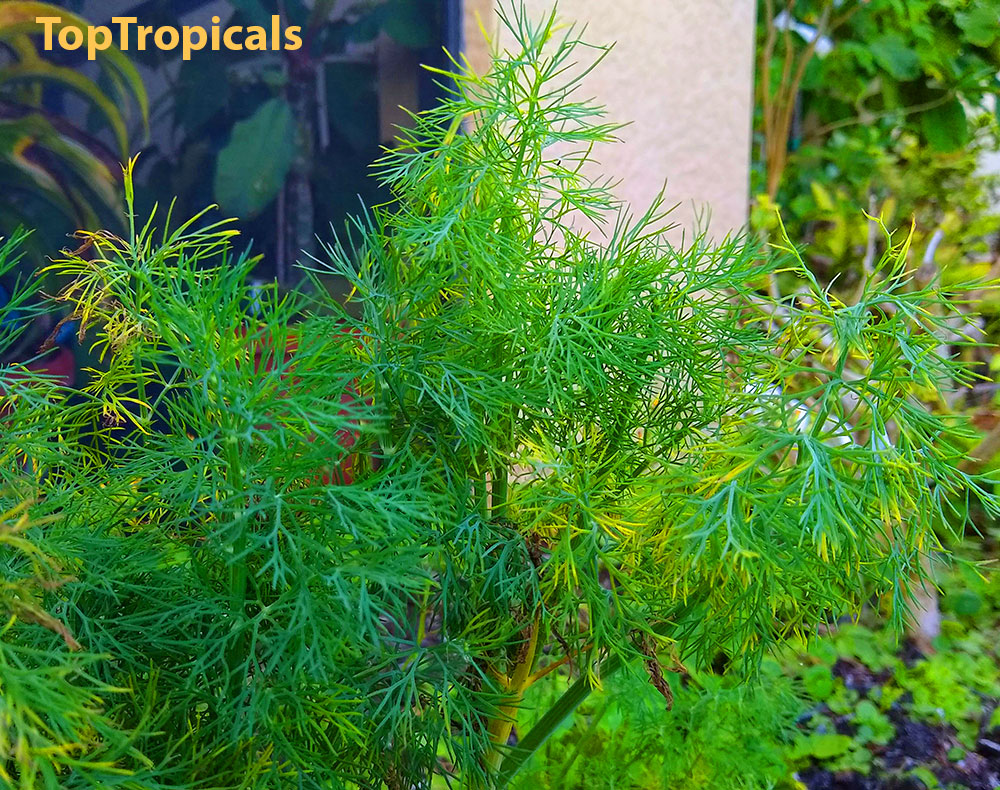Garden Blog - Top Tropicals
Date:
Gemini - 5/21-6/20.
Ruled by the mutable, changeable planet Mercury (also patron of the art of medicine), Gemini is an AIR sign. Plants ruled by Mercury tend to have ferny or highly-divided leaves or stems (like the bronchi of lungs), hairy or fuzzy leaves (related to the cilia in the lungs), or subtle odors.
Gemini rules the lungs, shoulders, arms, and hands. Its plants help to strengthen the lungs and respiratory system, relax the nervous system, strengthen ears and hearing, the tongue and speaking, the vocal cords, lungs and thyroid, as well as the shoulders, arms, and hands. Gemini has so much going on mentally that they may need a little help to digest all the information they're constantly absorbing. Herbs that have clean, pure flavor not only help physical digestion, but assist spiritual and mental intake as well.
Gemini Zodiac lucky plants: Ferns, Blechnum, Tree ferns and Cyatheas, Fern Tree, Aralias, Jackfruit and Breadfruit, Paulownia, Anthurium, Philodendron, Philadelphus, Clerodendrums, Anise, Lavender, Myrtle, Nut trees, Macadamia, Ficus, Piggyback plant - Tolmiea menziesii, Aloe vera, Fig, Honeysuckle, Azalea, Mint Tree Satureja, Vitex, Ironwood, Mulberry, Osmoxylon, Acalypha, Allamanda, Aphelandra, Iboza, Ruda, Kiwi, Caesalpinia, Cyphomandra, Monstera, Kalanchoe, Magnolia, Oregano, Ocimum, Naranjilla, Zamia, Delionix, Acacias, Calliandra, Patchoili, Palms, Geranium, Grevillea, Eucalyptus.
For other signs information, see full Plant Horoscope.
Date:
Wounded Warrior Project donation
Thanks to your memorial day orders! In honor of the memory of fallen brothers and sisters in battle, Top Tropicals sent a substantial donation of 5% of Memorial Day Promotion sales to Wounded Warrior Project. Reference ID: 43810379. Thank you everybody for your orders and participation!
Gemini Zodiac lucky plants

Gemini -
5/21-6/20.
Ruled by the mutable, changeable planet Mercury (also patron of the art of
medicine), Gemini is an AIR sign. Plants ruled by Mercury tend to have ferny
or highly-divided leaves or stems (like the bronchi of lungs), hairy or fuzzy
leaves (related to the cilia in the lungs), or subtle odors.
Gemini rules the lungs, shoulders, arms, and hands. Its plants help to
strengthen the lungs and respiratory system, relax the nervous system, strengthen
ears and hearing, the tongue and speaking, the vocal cords, lungs and
thyroid, as well as the shoulders, arms, and hands. Gemini has so much going on
mentally that they may need a little help to digest all the information they're
constantly absorbing. Herbs that have clean, pure flavor not only help
physical digestion, but assist spiritual and mental intake as well.
Gemini Zodiac lucky plants: Ferns, Blechnum, Tree ferns and Cyatheas, Fern Tree, Aralias, Jackfruit and Breadfruit, Paulownia, Anthurium, Philodendron, Philadelphus, Clerodendrums, Anise, Lavender, Myrtle, Nut trees, Macadamia, Ficus, Piggyback plant - Tolmiea menziesii, Aloe vera, Fig , Honeysuckle, Azalea, Mint Tree Satureja, Vitex, Ironwood, Mulberry, Osmoxylon, Acalypha, Allamanda, Aphelandra, Iboza, Ruda, Kiwi, Caesalpinia, Cyphomandra, Monstera, Kalanchoe , Magnolia, Oregano, Ocimum, Naranjilla, Zamia, Delionix, Acacias, Calliandra, Patchoili, Palms, Geranium, Grevillea, Eucalyptus.
For other signs information, see full Plant Horoscope.
Date:
Gemini
- 5/21-6/20. Ruled by the mutable, changeable
planet Mercury (also patron of the art of medicine),
Gemini is an AIR sign. Plants ruled by Mercury tend to
have ferny or highly-divided leaves or stems (like the
bronchi of lungs), hairy or fuzzy leaves (related to the
cilia in the lungs), or subtle odors.
Gemini rules the lungs, shoulders, arms, and hands. Its
plants help to strengthen the lungs and respiratory
system, relax the nervous system, strengthen ears and
hearing, the tongue and speaking, the vocal cords, lungs
and thyroid, as well as the shoulders, arms, and hands.
Gemini has so much going on mentally that they may need a
little help to digest all the information they're
constantly absorbing. Herbs that have clean, pure flavor
not only help physical digestion, but assist spiritual and
mental intake as well.
Gemini Zodiac lucky plants: Ferns, Blechnum, Tree ferns and Cyatheas, Fern Tree, Aralias, Jackfruit and Breadfruit, Paulownia, Anthurium, Philodendron, Philadelphus, Clerodendrums, Anise, Lavender, Myrtle, Nut trees, Macadamia, Ficus, Piggyback plant - Tolmiea menziesii, Aloe vera, Fig , Honeysuckle, Azalea, Mint Tree Satureja, Vitex, Ironwood, Mulberry, Osmoxylon, Acalypha, Allamanda, Aphelandra, Iboza, Ruda, Kiwi, Caesalpinia, Cyphomandra, Monstera, Kalanchoe , Magnolia, Oregano, Ocimum, Naranjilla, Zamia, Delionix, Acacias, Calliandra, Patchoili, Palms, Geranium, Grevillea, Eucalyptus.
For other signs information, see full Plant Horoscope.
Date:
Leo Zodiac lucky plants


Leo - 7/23-8/22. Naturally, Leo is a FIRE sign ruled by the brilliant Sun. Leo's plants are usually large and gold or orange in color, have heart-shaped leaves or a radiating shape, or have association with victory (like the Bay Leaf). Leo loves this colorful and special spice, which is known for amplifying prosperity and abundance.
The part of the body ruled by Leo the Lion is the heart. Plants related to Leo are primarily associated with the cardiac system, but also with the spine, the thymus gland, and the eyes. They strengthen and tone the heart, regulate blood pressure, raise the spirits and have an uplifting effect. Keep in mind that all cardio-active medicinal herbs should be used only in consultation with a qualified professional.
Leo Zodiac lucky plants: Sunflower tree, Delonix, Hibiscus, Abutilon, Mahoe, Hawaiin Sunset Vine (Stictocardia), Campsis, Passion flower, Calendula, Mexican Flame Vine, Bay Leaf, Safflower, Mint, Rosemary, Ruda - Ruta graveolens, Marigolds, Sunflowers, Palm trees, Lemon and orange trees, Grapefruit, Dieffenbachia , Croton, Lemon Balm, Chamomile, Tarragon, Kaligottu (Stereospermum chelonoides), Bel Fruit, White Madaar, Peppers, Pineapple, Coconut, Anise, Heliotrope, Gingers, Lavender, Ashoka Tree, Dombeya, Jacquemontia, Lychee, Mulberry, Philodendrons, Macaranga, Anthuriums, Aphelandra, Orchid trees, Leonotis.
For other signs information, see full Plant Horoscope.
Date:
Re-Leaf discount extended!
The prettiest plants of the month
Aphelandra sinclairiana - Panama Queen
We thank everyone who made a purchase in the past few days, you made a big difference! We continue clearing debris and rebuilding our greenhouses. Thanks to your support, we will be able to get our plants ready for winter! This is what we are doing this month:
rebuilding woodframes for greenhouses
installing new shade cloth and plastic
cutting fallen trees
getting new equipment that suffered from flood
adding rock in the nursery to be ready for the Fall Festival
You help us - we help you!
Ask for more RE-LEAF specials when you visit our Garden Center!
Hurricane Ian re-leaf discount extended
For 10% off your entire order, use this code:
IANRELEAF
Use this code on top of our fantastic deals and make it a
super deal:
As low as $5
sale of selected items
Secret
Garden - 50% off
Min order $100. Exp. 10-08-22.
Hedychium flavum x coccineum Dr. Moy - Variegated Hardy Ginger Lily
Date:
Fragrant Gold Leaf Orchid Vine
By Onika Amell, tropical plant specialist
Q: I am absolutely thrilled to see you have this vine. I've tried for years to get this plant! It is so, so rare. It just seemed impossible to find in this country. How do I make it thrive? I am ordering two.
A: We are happy to confirm that indeed we do have this rare vine!
Bauhinia aureifolia - Gold Leaf Orchid Vine - was discovered in Thailand in
1983. It is endemic to Pattani, Narathiwat, and Yala in Southern Thailand.
Danish botanist Kai Larsen named this plant and hailed it as one of the rarest
plant species of the world when it was discovered in the eighties.
The Thai people call this vine Bai Mai Si Thong. It is a beautiful
climber with large, bi-loped leaves (7 inches or more!) and good branching.
Young leaves are a stunning burnt orange to terracotta color for about
a week and as they reach full size, they turn green over a couple of days.
This is a very rare color for Bauhinia. It produces leaves all the time and
this means this vine is always full of beautiful color. With its golden leaves,
it sure is reminiscent of Autumn.
This vine blooms from May to November. It bears bunches of small
flowers that are delicately fragrant in the evenings. The cultivated plants range
flower color from pure white to purple and pink, while the wild ones have
often white petals with pinkish patches.
Bauhinia aureifolia needs well-drained soil, full light and good humidity
to thrive. It will tolerate a light freeze once established and it is very
important to protect young plants.
Gold Leaf Orchid Vine also makes a wonderful container plant with staking
or support. It is a must for every rare plant collection!
RECOMMENDED FERTILIZERS:
Pink N Good Daily Plant Food - Flower Booster
Tropical Allure - Smart-Release Booster
Date:
Healthy Plants: Q&A from Mr Booster
How to grow a happy Red Jade Vine?
Q: My Red Jade Vine has the leaf tips turning brown. I water this plant four times a week and I am using a half a teaspoon of miracle grow bloom booster 15-30-15 per 2 gallons, every two weeks. In the beginning I had to water this plant off city water in South Fort Myers. Over the last two months I picked up a dechlorinator buggy plus threw that on my hose and I've been watering it with that but it didn't seem to make a difference. I put this plant in the ground last September. It has three shoots that run into the top of the tree, so it is growing but leaves seem to drop off down low at the base of the vine and the brown tipping running into the top of the plant. But not the newest shoot its leaves are solid green all the way at the top. Thanks for any advice.
A: Mucuna benettii - Red Jade vine - is not the easiest plant to grow, and
we are glad your vine is growing well. For those who love this plant but not
ready to face all challenges, we recommend its cousin - Camptosema grandiflora - Dwarf Red Jade Vine, which is much hardier and
easier plant.
We looked at the photos and these are our thoughts.
1) The top of the plant with green fresh leaves definitely indicates
that the plant is generally healthy and vigorous.
2) Dry tips of the old leaves may indicate excess salts in soil, in
combination with the summer heat that it went through. Based on your feeding program
description, that fertilizer may create a problem. Water soluble traditional
fertilizers are EDTA-chelated which often causes nutrients lock up in soil
and leaf drop. Try to stay away from that fertilizer for a month and let the
rains and/or irrigation water flush the soil for a couple of weeks.
3) Red Jade vine is a very sensitive species. Normally, during hot season
it is safe to use traditional fertilizers, especially slow-release granulated.
However, with this plant we recommend you to switch to more delicate formula
and use only liquid fertilizer.
SUNSHINE Megaflor - Bloom Nutrition Booster will be the best. It is
safe to use it as frequent as with every watering! It is amino-acid
based, and will be totally consumed by the plant without nutrient lockup.
4) Another cause of dry leaf tips may be micro-element deficiency.
Megaflor booster already has all necessary micro-nutrients in it, plus you
may apply some extra: SUNSHINE Superfood.
5) You may continue using regular water for watering (including city water)
as long as you use amino-acid based plant food and supplements: they improve
soil acidity (what tropical plants like is acidic soil, and Florida soils
are alkaline). Additionally, to improve soil acidity which can be critical for
this Mucuna species, you may add 1" layer of pure peat moss on top of the
soil around the plant. Please keep us in loop how the plant is doing. It is
pretty rare species in cultivation and we will be happy to help you to keep it
thriving.
Date:
Jungle on Windowsill 101
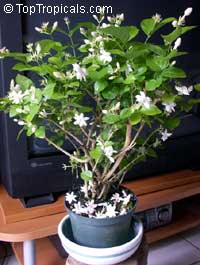
Q: I got a Jasmine Sambac and a Tahitian gardenia as presents, they are very cute plants with flowers and flower buds. I would like to be able to keep them alive and hopefully happy for a long time, but I don't know much about growing tropical plants, and I am not sure if my thumb is green enough to make everything right. What do they need? How much sun? How much water? What kind of soil? Sorry for all these (maybe silly) questions, but I want to keep them alive, please help! I live in Wisconsin and we had some snow again last week.
A: Growing tropicals is not a hard work, it is a lot of fun! These plants are actually a good starters for a beginner who wants to try growing tropical plants, no matter if you live in a mild frost-free climate, or up North where you can have these beauties as houseplants. Below are a few simple steps for you:
1. Read. Follow planting instructions included with your plants. Check plant names on the tags and learn more about them from our online catalog.
2. Soil. Plant in quality potting mix - it must be porous and well-drained, never use heavy soils (top soil or garden soil are no-no), in a pot exactly the size of the root system. You can step up your plants in the next size container once you notice vigorous new growth. Next size means: 4" pot can go into 6" pot, 6" pot into 10" pot, etc. Too big of a pot may create rotting environment, root system must fill the entire container to use all the moisture from the soil. Container must have good hole(s) for excess water to drain through. Put the pot in a saucer and get rid of excess water every time after watering.
3. Light. Most tropical plants require lots of light in order to produce flowers. If you ever visited Florida, remember the bright sun? - these are ideal light conditions for tropicals. Up North, provide as much light as possible: a bright spot on a windowsill of Southern or Western exposure would work the best. If the sun gets too hot in summer afternoon, you may shade the window a little bit with a sheet of white paper to avoid leaf burn.
4. Water. Keep soil slightly moist but not soggy. The best way is to wait until the top of the soil feels dry to touch - this is time to water again. Jasmines prefer to stay on a dry side; gardenias do not like soil to dry out - keep them slightly moist as long as soil is very porous and well-drained.
The main reason of most problems with potted indoor plants is over watering. With experience, you will feel the right balance of moisture in the soil: the brighter the light, the more water is consumed by a plant; the less light, the less frequent you should water.
5. Trimming. In low light conditions, plants tend to become leggy. Trim branches as they become too long: the more you trim, the busier the plant gets. New growth promotes more profuse blooming in many species.
6. Fertilizing. Fertilize indoor plants with slow-release granulated fertilizer from march to November.
7. Insects. Check for insects at least once a month, especially underneath the leaf. If notice any problems (deformed leaves, residue, holes, or tiny insects) - clean the leaves/stems with a solution of warm water (1 cup), vegetable oil (2 table spoons), and a few drops of a dish soap.
8. Fresh air and air humidity. As soon as air temperature gets above 65F, bring your tropicals outside in the sun and fresh air: porch, balcony, outside in the yard. Air circulation is essential for your plant health. Bright light and high air humidity will promote vigorous growth, and lots of flowers for you to enjoy!
For more information on growing Tropical Plants 101, see Problem solving with potted plants - how can we help them?.
Date:
Easy Sunday Morning Deals: Tropical Asparagus
Saving on your favorite plants is Easy.
Easy like Sunday Morning...
Photo above: Aphelandra hartwegiana - is at peak of its flowering season now. Spectacular flower for a shade garden.
It's time for our favorite day and another Easy stroll through Top Tropicals' Garden with savings of 50% and MORE! Christmas Day has come and gone, and now it's time to treat yourself with our Easy Sunday Deal!
This week we bring you one of the most popular leaf vegetables in South Asia and Southeast Asia, the Tropical Asparagus - Sauropus androgynus. Notable for its high yields and palatability, Tropical Asparagus is a favorite with crab meat, minced pork, dried shrimp, or to make soup... and has delicious young shoots!
Tropical Asparagus
50% OFF and MORE!
For this Easy Sunday we have priced these at incredible savings:
Sauropus androgynus, regularly $39, is on Easy Sunday sale for only
$19
Sauropus Variegata, regularly $39, is on Easy Sunday Sale for only
$19.
Combine the two for your own Tropical Asparagus Kit and save even more, only $29 for the kit!
While supply lasts.
About Sauropus androgynus - Katuk, Tropical Asparagus
Sauropus, or Katuk, is a perennial shrub grown in some tropical regions as a leaf vegetable. It is one of the most popular leaf vegetables in Southeast Asia. It is among only a few flora containing vitamin K. Leaves and stemmed can be cooked as vegetable; young shoots are delicious eaten out of hand and taste just like sweet peas, they can be added to salads. The plant has many medicinal properties.
Katuk is fast growing and keeps growing as you trim it for your kitchen needs. Multiple upright stems can reach 6-7 ft high. It has great ornamental value, has pretty red flowers and ornamental fruit showing shiny black seeds when they crack open. Varieties with green leaves and variegated leaves have slightly different flavor but are equally good for your healthy, fiber-rich diet.
Remember, the Easy Sunday Deal expires on Wednesday December 29th.
Enjoy your Hot Deals!
December 26th - Boxing Day
Remember, December 26th is Boxing Day, with different theories on the roots of Boxing Day, but one commonality: Boxing Day is a day for charity and kindness. Let's all continue to be charitable and kind humans!
Date:
Garden Sustainability Tips: Live your Life. Dig your Garden.
You can grow herbs and vegetables that can be easy incorporated into your home landscape. You don't need a raised bed for a few little things that will come really handy for your kitchen.
1. Parsley. Get a small 4" pot parsley plant from a local garden
center. It grows super fast and just one plant can provide great healthy
addition for your cooking for a few months. Plant in in full sun, under a tree or
shrub, where it gets hit by a sprinkler.
2. Dill. This one grows from seeds quickly and easily. It also needs
full sun and regular water.
3. Chives, or Green Onion. Don't through away "bulbs" from chives
you got from the store. Stick them in the ground, pretty much anywhere in your
garden. You will have supply of fresh chives loaded with vitamins right away
(withing a few days!) and for many months. You can also plant an onion bulb
(root-end down... duh) - this one will produce greens even faster!
4. Bay Leaf. If you live in a mild climate, plant a Bay Leaf in your yard (closer to the door - closer to the kitchen!). It
is a wonderful healthy spice for soups and stews that makes them super
flavorful. If your winters are cold, keep the plant in a pot. Bay Leaf makes a
great undemanding houseplant that needs bright light, but very little water.
5. Cherry tomatoes are easy to grow, heat tolerant and even grow in
lower light, so they are easy to incorporate into any existing landscape. Get
Sunshine Boosters to double your crop: see how it works.
6. More herbs and spices. Check out our large selection of herbs and spices - they are on sale today!
7. Garden work is a great exercise. While the gym is closed - get to
gardening. Read about Fun workout and Calories Burning Gardening.
8. Lemons. Vitamin C is your best friend for boosting immune system,
and Lemons have tons of it! In areas where citrus can grow outside, Lemon
tree is a must-have for your garden, or at least find a friend who has one!
Citrus also makes a great house plant, so you can keep it in a pot, too. Just
make sure to have a grafted tree that will produce right away.
Lemon Juice Health Booster Recipe
1. Squeeze juice from 1 lemon and mix it with 1 cup of water.
2. Add ice cubes and 1-2 tbsp of any flavored syrup (optional). You may add
some fresh mint for Mojito flavor.
3. Enjoy this drink at least once a day.
4. Get a bunch of lemons, squeeze fresh juice into ice cube trays and
freeze. 1 lemon = makes 1 ice cube. Store in freezer and use 1-2 cubes to make the
above drink, daily.
Besides being rich in vitamin C that will boost your immune system,
Lemon juice is a Natural medicine that helps to treat:
- cold and flu
- headaches and high blood pressure
- stomach problems
- insomnia
- and much more
Drinking lemon juice on regular basis will make your body stronger and more
resistant to infections and many illnesses.
Please take good care of yourself and your loved ones. Stay healthy.


